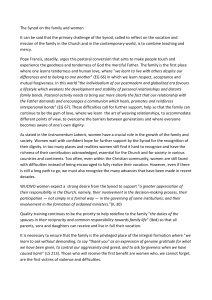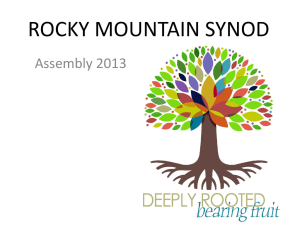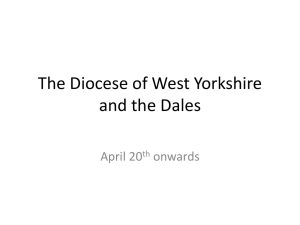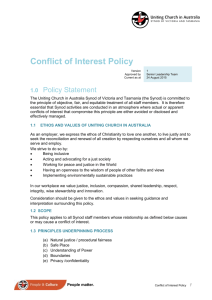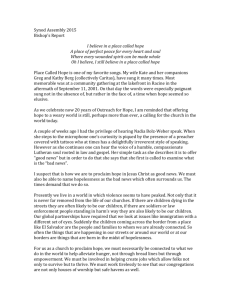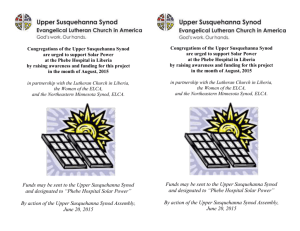document
advertisement
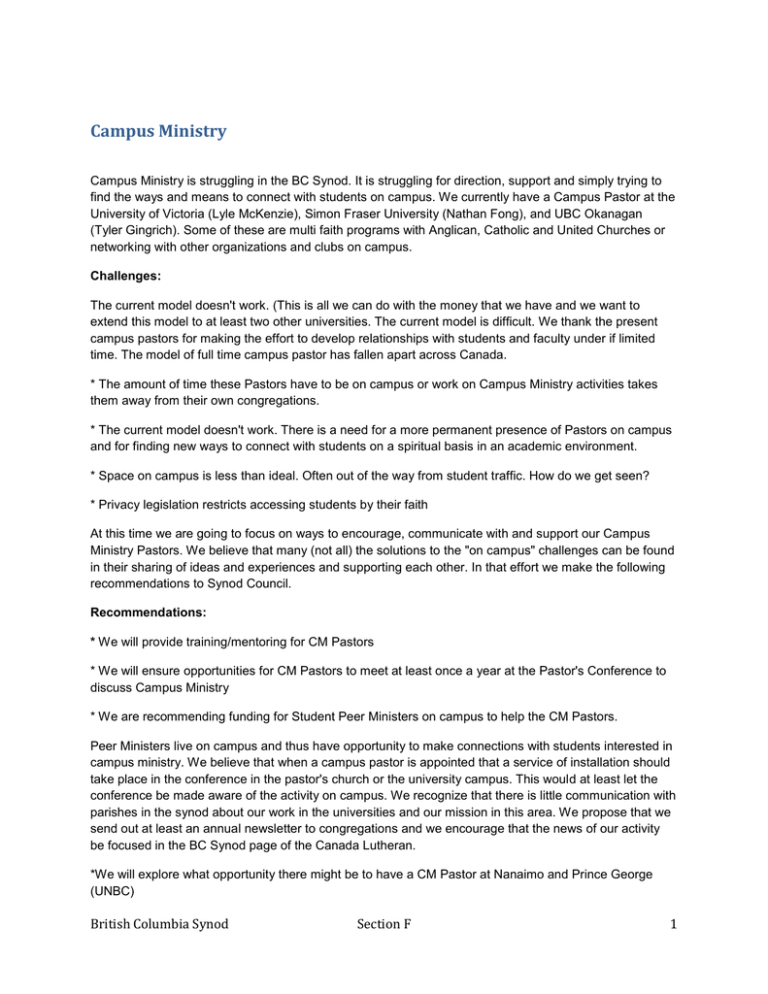
Campus Ministry Campus Ministry is struggling in the BC Synod. It is struggling for direction, support and simply trying to find the ways and means to connect with students on campus. We currently have a Campus Pastor at the University of Victoria (Lyle McKenzie), Simon Fraser University (Nathan Fong), and UBC Okanagan (Tyler Gingrich). Some of these are multi faith programs with Anglican, Catholic and United Churches or networking with other organizations and clubs on campus. Challenges: The current model doesn't work. (This is all we can do with the money that we have and we want to extend this model to at least two other universities. The current model is difficult. We thank the present campus pastors for making the effort to develop relationships with students and faculty under if limited time. The model of full time campus pastor has fallen apart across Canada. * The amount of time these Pastors have to be on campus or work on Campus Ministry activities takes them away from their own congregations. * The current model doesn't work. There is a need for a more permanent presence of Pastors on campus and for finding new ways to connect with students on a spiritual basis in an academic environment. * Space on campus is less than ideal. Often out of the way from student traffic. How do we get seen? * Privacy legislation restricts accessing students by their faith At this time we are going to focus on ways to encourage, communicate with and support our Campus Ministry Pastors. We believe that many (not all) the solutions to the "on campus" challenges can be found in their sharing of ideas and experiences and supporting each other. In that effort we make the following recommendations to Synod Council. Recommendations: * We will provide training/mentoring for CM Pastors * We will ensure opportunities for CM Pastors to meet at least once a year at the Pastor's Conference to discuss Campus Ministry * We are recommending funding for Student Peer Ministers on campus to help the CM Pastors. Peer Ministers live on campus and thus have opportunity to make connections with students interested in campus ministry. We believe that when a campus pastor is appointed that a service of installation should take place in the conference in the pastor's church or the university campus. This would at least let the conference be made aware of the activity on campus. We recognize that there is little communication with parishes in the synod about our work in the universities and our mission in this area. We propose that we send out at least an annual newsletter to congregations and we encourage that the news of our activity be focused in the BC Synod page of the Canada Lutheran. *We will explore what opportunity there might be to have a CM Pastor at Nanaimo and Prince George (UNBC) British Columbia Synod Section F 1 * As many of the Campus Ministry positions are based on a geographic decision, we would like to explore with the Synod the idea that Campus Ministry responsibilities be part of that congregation's call process and that part of the salary be paid by the Synod for Campus Ministry work. We are very grateful for Pastor Lyle McKenzie, Pastor Nathan Fong and Pastor Tyler Gingrich for their dedicated service and commitment to Campus Ministry. The Committee is especially thankful for the time they spent with us (away from their congregations and new family members) to tell us first had about Campus Ministry. Respectfully submitted: Judy Kochendorfer (Chair), Pastor Don Johnson, Linda Kompauer British Columbia Synod Section F 2 Communications At its meeting on March 23-24, 2012, the communication committee began by envisioning the impact its work might have on life in the synod: “The BC synod is informed, engaged and interconnected, with a strong sense of community that extends beyond the confines of local congregations. People are empowered and active in sharing information, resources, and stories about life in their contexts, and ideas are given a wide audience, that they might have the opportunity to cross-pollinate. We work together to uphold high standards of dignity, respect, and safety for those who use our media, in order that our media might continue to be affirming and supportive resources for the Gospel.” Given the geographic size of our synod, and given the modest budget and staff time available, it is clear that technology must play a significant role in our communication efforts. Up until now, the synod office has relied primarily on email and the synod website (bcsynod.org) as a vehicle for communicating. These media are useful tools, and remain the best choice for many types of communication, especially communication that originates from a central entity, such as the synod office. However, the communication committee has identified that there are many situations where it would be advantageous if people who didn’t necessarily know one another could connect via the internet without having to rely on the synod office to function as an intermediary. Consequentially, a need has been identified to add another internet-based communication tool to our synod’s toolkit. We have never lived in a time when there were more abundant and more powerful communication tools available to us. Each of these tools has benefits and drawbacks; it is important to choose the right tool for the right job. It is also important to acknowledge that all useful tools can be harmful when used carelessly. This is true of tools found in a workshop; it is also true of tools on the internet. After much discussion, the communication committee has decided to add the social media service known as “Facebook” to our synod communication toolkit. The main reason for choosing Facebook over other available tools is that a vast number of people are already using it on a daily basis: as of late 2011, over 800 million people were active Facebook users. The committee’s intention is to develop separate Facebook pages geared toward three types of content: 1. A British Columbia specific page, which will be a place to announce upcoming events, share stories of events that have already happened, and contribute other resource material. 2. A page dedicated to theological reflection and discussion. 3. A page with content that would be of interest to a national audience. The communication committee is presently in discussion with the ELCIC national office for expanding the content which appears on its Facebook page. Subscribers to these pages will receive stories and announcements on their Facebook news feed. They will also be able to post their own stories and announcements to these pages, which will be curated by a number of page administrators who will decide whether posts are suitable to be sent out to the whole subscriber base. Page subscribers will also be able to converse with one another about these posts. Non-subscribers and people who prefer not to be Facebook members will be able to view these pages, but they will not be able to contribute to them or comment. The communication committee recognizes that this tool will be unfamiliar to many, and that not everyone will choose to make use of it. This is perfectly understandable. However – it is the committee’s intention to ensure that anyone who wants to participate is connected with the resources and training they need so that they can do so with confidence. We are in the process of identifying people in each region of our synod who can be called upon to provide training and assistance, and have allocated part of our budget to cover travel expenses should this be necessary. British Columbia Synod Section F 3 In the next few months, policies and terms of use for these pages will be developed, regional administrators and trainers will be recruited, names for these pages will be chosen, and they will go online. Details about these pages will be publicized as soon as they are ready and they will immediately be open to subscribers; the remainder of 2012 will be used to allow these pages to gather momentum. Promotional materials advertising these pages and explaining how to use them will be provided at the 2013 Bishop’s Study Conference. Respectfully submitted by Erik Bjorgan – Pastor, Deo Lutheran Church, Salmon Arm. Chair, BC Synod communication committee. British Columbia Synod Section F 4 Faith and Society Our Synod bylaws articulate the mandate for the Faith and Society committee: Section 1. The task of the committee shall be to: a. equip and challenge members of this Synod for Christ-centred ministry in society wherein faith is activated in love toward justice and reconciliation in the human family, working in consultation and harmony with the parallel offices and structures of the ELCIC; b. seek to assist this Synod and its congregations to: i. participate in appropriate programs, resource development, partnerships, networks, institutes and legislative processes in society with a Christ-centred ministry; ii. participate in appropriate programs, chaplaincies, and institutions in the area of extended care ministry; iii. receive, identify, and articulate issues, needs, and concerns in all aspects of ministry in society, and to develop and implement strategies of response, both individual and Corporate Constitution and Bylaws 20 - September 2011 iv. address issues of justice within this Synod and its congregations. Throughout the last two years, there has been a significant turnover of members serving on this committee, as well as changes in leadership. At this point in time, we wish to share the initiatives, causes and goals we have set for the committee’s work over the course of the next two years: Poverty Reduction in BC: In support of addressing chronic and systemic poverty in our province, a motion will be presented at Convention in regards to the Synod becoming a signatory to the Provincial Poverty Reduction Coalition, in response to its Call to Action. Further, we will ask that the Bishop write a letter to the Premier and the Leader of the Official Opposition indicating the Synod’s support for this initiative. Advocacy and Support for Migrant workers: In response to a letter received highlighting the need for migrant workers to have advocates and a voice to address their plight, we will discern how best we can help migrant workers regionally and with our partners in KAIROS. Truth and Reconciliation Commission: As a tangible way to show support for the victims of the residential debacle, the committee directed that adequate funds from its current budget be directed to cover the costs of a survivor being able to have the resources to testify at the Truth and Reconciliation Commission event being held in Victoria on April 13th and 14th. A letter will be sent across the Synod to encourage people to be aware of the TRC events and support this healing work as they are able via presence, donation, growth in awareness, and/or prayer. UN Declaration of Rights of Indigenous Peoples: we will be examining this core document as a means by which to determine next steps when faced with the challenges of Bill C10, the Northern Gateway Pipeline, and the like. Affirmation of National Convention Motions in regards to unity and sexuality: will work to encourage congregations to affirm the motions of the National Convention, lifting up the good news coming out of congregations and to celebrate decisions for inclusivity. Support for KAIROS: we will encourage congregations to support KAIROS and to advocate for the full reinstatement of their funding by the federal government. Communication: create a Facebook page, a page on the Synod web page, and a newsletter to communicate ideas, issues and opportunities for mission and response throughout the Synod in an expeditious manner. It is of vital importance that we develop and facilitate mediums to British Columbia Synod Section F 5 encourage the sharing of knowledge and expertise in order to inspire and teach one another across the Synod in these and other endeavors of faith in action and learning. Congregational Point Persons: Be intentional about encouraging congregations to identify one person in their congregation to be the Faith and Society person who will receive and disseminate information about issues and options for response throughout their faith community. Data Bank: create a data bank of the advocacy, ministry and outreach that is already occurring in the Synod for the purpose of inspiring and helping one another in this holy work. A starting point will be the survey that was completed two years ago. Synod Work Project: replacing the roof of the church in Sandspit. This Synod wide work project was launched in 2011. The congregation in Sandspit is a vital part of its community. Its outreach is extensive especially in the midst of difficult times. The faith community has offered a place for renewal for many of our clergy and leaders over the years. The congregation needs assistance in replacing its roof so that it can continue its ministry of presence. Budgeted amount required is $20,000 plus. To date, just over $1200 has been raised. This committee will continue to encourage support for this initiative throughout the Synod as it is hoped work on the roof can be done the summer of 2012. Throughout Jesus’ ministry, he was on the side of the marginal, the outcast, the lowly. It is our hope that we would be known as his disciples, seen to be walking in his footsteps, through our actions in faith. Respectfully submitted, Brenda Nestegaard Paul, chair Kate Anderson Jim Berger Carol Dennision, Synod Council liason Tim Dutcher-Walls Tyler Gingrich Jonquil Hallgate Stephan Wagner Jim Whaley British Columbia Synod Section F 6 Faith and Society Resolutions for the ELCIC BC Synod Convention 2012 Motion: I move that the BC Synod in Convention become a signatory to the “Call to Action” of the BC Poverty Reduction Coalition for the implementation of a Provincial Poverty Reduction Strategy and that Synod members request the Bishop to send a letter to the Premier and to the Leader of the Official Opposition indicating its support and request for action on the creation of a Provincial Poverty Reduction Strategy. Motion: I move that the BC Synod in Convention urge its member congregations to become signatories to the “Call to Action” of the BC Poverty Reduction Commission for the implementation of a Provincial Poverty Reduction Strategy and to individually send letters to the Premier of the Province and to the Leader of the Official Opposition indicating their support for the “Call to Action”. Motion: I move that the BC Synod in Convention urge the Government of the Province of British Columbia to implement a comprehensive targeted “Provincial Poverty Reduction Strategy” with specific goals, objectives and target dates to reduce/eliminate poverty in British Columbia. Specifically to work cooperatively and in a timely fashion with civic governments to develop new, innovative and creative ways to increase the stock of affordable housing for the people of our province. British Columbia Synod Section F 7 Specialized Ministry We Are Called We are called to act with justice, we are called to love tenderly; we are called to serve one another, to walk humbly with God. Refrain, Hymn 720 from the Lutheran Book of Worship This small, but mighty band of committee members consists of: Fred Gehrs, Willy Olesen, Ray Niebergall and myself. At the time of writing this report we are in need of one more member to replace Kathy Martin who was elected to the National Church Council at last summer’s National Convention. Kathy’s contribution and support of this committee was very much appreciated. This committee, who keeps in contact with Pastors in non-parish settings, is, I believe, the only one of its’ kind in Canada. We support all Specialized Ministers working in B.C. Some are working as Educators, others working in Corrections/Youth Custody as well as in Urban Ministry. The greatest number of Specialized Ministers work, in Hospitals, Extended and Senior’s Care Facilities. There are also Pastors in Administrative, Synodical and Ecumenical positions, which include our Bishop. Also, some are in Interim Ministry and at present we have two in Diaconal Ministry. While their number fluctuates, at last count there were 16. The committee is in the beginning stages of a 2 year process of evaluating what we do well, what is being overlooked, what overlaps, and should our mandate be expanded? Work has begun on the review of our Policy Manual. It is our hope that 2 years hence we will have a clearer picture of what Specialized Ministries includes. For many of our Specialized Ministers--despite changes in legislation and financial constraints to name a few of the additional challenges they face--we are struck by the passion and dedication these women and men bring to their individual ministry, their Calling. We in the BC Synod are well and truly blessed by the work they do. We thank them and ask that you remember them in prayer. Yours in Christ, Allyson Aporta Committee Chair . . . now there are varieties of gifts . . . of services . . . of activities . . . (1 Corinthians 12) British Columbia Synod Section F 8 Theological Education and Leadership (CTEL) CTEL Repot to 2012 Synod Convention I am pleased to submit this report on the work of the committee for Theological Education and Leadership. The BC CTEL committee is made up of Bishop Greg Mohr, Rev. Ian Nestegaard-Paul, Rosalene Saleski, Harald Kubert, Sue Palmer, Rev. Lorin Koss, and Rev. Dr. Jann Boyd The primary task of the CTEL committee is the shepherding of candidates for professional leadership through the process that leads to their becoming pastors and diaconal ministers in our church. This process involves meeting with the candidate to provide initial endorsement for their candidacy; arranging that they receive psychological and career assessment; and ensuring that our candidate meets all of the professional requirements outlined in the candidacy manual of the ELCIC. Throughout the process, the CTEL committee tracks, encourages and guides the candidate through their training. A bottom line measure for the committee is that we are listening for the voice: of pastors and lay people; professors and teachers; CPE supervisors; internship supervisors and lay committees; i.e. all involved in the training of the candidate, saying, “We hear and see God calling this person to a professional leadership role in our congregations and church.” CTEL is a committee listening to the voice of the church as it calls its pastors and diaconal ministers. Since our last convention the following candidates for ministry have passed colloquy or gone on to their first call: Pr. Fleming Blishen Pr. Courtenay Reedman Pr. Barbara Groote Jane Gingrich. We are delighted with the potential for ministry these candidates bring to our church. We have challenges: The biggest challenge that we face is the declining enrolment of candidates. We do not have enough people to meet the foreseeable needs of our church. In order to address this issue we have interviewed pastors to speak about how they were called into ministry and their experience of ministry. Our hope is that a video of these positive endorsements of ministry will be shown for you at this convention. And, our real hope is that this might encourage you to speak to your own children and the children of your congregation about serving the people of God in professional leadership roles. This need is desperateyour help is needed. A second challenge we face is that our current candidates have been more inclined to work on individual learning plans and timelines. We are no longer seeing candidates entering the traditional stream of 2 academic years at our seminary followed by an internship and then a third academic year at the seminary. Alternative models for delivering theological education are being explored by our Seminary in Saskatoon but this challenge tests the formation of our church’s professional leadership. Finally, Bishop Greg asked our committee to explore and present a model for theological education for lay people comparable to the professional leadership study conference. This request has not been moved forward. I apologize, and would encourage the convention to give this assignment to CTEL again because there is a willingness on the part of the committee to bring such a conference forward Respectfully submitted Pastor Kim Staus, BC CTEL chairperson British Columbia Synod Section F 9 Youth Ministry The synod youth committee has undergone a great amount of change in the past two years. Most of the committee including the chair has changed. The committee met in March 2012 to start fresh. We are full of new members and new energy. We reflected on what has happened in the past in the synod with regards to youth ministry and spent the majority of our time looking to the future. We chose a few areas to focus on for the rest of 2012 and into 2013. We believe that being in touch with youth leaders and youth contact people in congregations and helping them to be in touch with each other is a vital part of youth ministry. With this in mind we will be starting a BC Synod Youth Ministry Facebook page in the near future. We will also be in contact with each congregation to get contact names and information from each of them to build our network. We also recognize that youth ministry does not mean just youth group and there are many congregations who are engaged in youth ministry but do not have a formal youth group. Two of the members of the committee have been tasked with putting together a resource for congregations where youth ministry takes a variety of others forms. Look for it on the synod website in the fall of 2012. As youth groups throughout the synod prepare to attend CLAY 2012 (Canadian Lutheran Anglican Youth Gathering www.clay2012.ca) in Saskatoon this summer we are hoping to have a synod tshirt for the CLAY gathering this summer in Saskatoon. We have asked one of your young adults to help with the design of the t-shirt. As we move towards the future we are continuing on with the vision that the committee before us began. They had a focus on youth leader training at the synod level and regional youth events, considering the geographical size of our synod and the limited financial resources of many youth and congregations we believe this is the right direction to continue in. We are hoping to put together a youth leader training event in May of 2013. One of our hopes for this event will be that youth leaders from various regions of the synod will be able to meet each other and begin to plan regional events for their youth. We are all excited about the renewed energy in this committee and look forward to supporting and advocating for youth ministry in the future. Respectfully submitted Rev. Rick Schulz (chairperson) Aneeta Saroop Ryan Buhrig David Wills Colin Staus Bronwyn Nestegard-Paul Rev. Kristen Steele British Columbia Synod Section F 10 Worship The members of the Worship Committee are Sylvia Duncan, Vida Jaugelis, Karla Paciejewski, George Pell, Barbara Perry, Lorraine Reinhardt (chair) and Kim Emmett (Synod Council). We met twice in 2011 and once in 2012. We discussed several ideas we would like to implement to help encourage and inspire worship leaders in the Synod. 1. Creation of a web page which would include a newsletter, information about upcoming workshops and conventions of interest to worship leaders, suggestions for services in upcoming Sundays or seasons, book reviews, and articles about our church practices and how they came to be used, for example, imposition of ashes on Ash Wednesday. We are waiting for the Communications Committee to report back to us on the implementation of this web page. 2. Our first newsletter was published in February 2012. For this first one, only an electronic version went out to all congregations of the BC Synod. Subsequent newsletters will potentially be sent by both email, and hard copy for those who don’t have email. 3. Commission a hymn which will be used as the theme hymn for the Synod Convention in May 2012. The hymn can be taken home from convention by the delegates and others in attendance and used in local congregations. We have asked Peter Reinhardt to write a hymn and tune, and he has accepted. It will be premiered at the opening worship at convention. 4. Collect names and contact info for various worship planners and leaders from all congregations in the Synod. Our plan is to send our newsletter to congregations generally, and also to specific people who are involved in worship. Due to computer difficulties, our first list has been lost so we will ask again for names and contact information for worship leaders from each congregation. 5. Offer workshops for education and inspiration. These may be held in different conferences, or perhaps just prior to, or just after, Synod Convention. A workshop will be offered on Thursday May 10, 2012, before the opening worship of this convention. 6. One of our primary activities is to plan worship for the Synod Convention. This has been done in consultation with Bishop Greg. Faithfully submitted, Lorraine Reinhardt, chair British Columbia Synod Section F 11 UBC Campus Centre Task Force UPDATE: LUTHERAN CAMPUS CENTRE PROPERTY AT UBC Prepared by the Task Force for Redevelopment April 2012 Since the last convention of the BC Synod, the Synod Council has devoted considerable energy to researching redevelopment possibilities for its property, the Lutheran Campus Centre, positioned at the doorstep of the University of British Columbia. In its 2010 Convention the BC Synod made the following decision: 2010BCSyncon-10: MS that the BC Synod in convention instruct the BC Synod Council to form a committee to examine the options for the possible commercial development of the land upon which the UBC Lutheran Campus Centre is located in order to support the campus ministry of the BC Synod. Carried. RESEARCH In the fall of 2010 the Synod Council formed the Campus Centre Research Committee, and appointed Rev. Clifford Reinhardt Chair of the Committee. Additional full members were Hans Gust, Jeff Rice, Philip Schulze. The Committee also benefited from the counsel of Rod Adam, an experienced developer and Lutheran church member. Here are the key findings: 1. The Committee learned very quickly that commercial development was indeed possible financially, because of the burgeoning population of both the University of British Columbia and the University Endowment Lands. (The Synod's property is actually part of the University Endowment Lands, but sits right at the border with UBC.) There is high demand for housing and related services. 2. Within a few months, the Committee also learned that commercial redevelopment was possible politically, because of openness to rezoning by the University Endowment Lands. 3. The Committee concluded that commercial development would be possible by way ofajoint venture with a development company. In such an arrangement the Synod would give up part of its ownership of the property in exchange for space in the new facility; or for a "legacy" (that is, a capital sum which the Synod could subsequently invest to generate interest to fund ministry); or for a combination of facility space and legacy. 4. But the Committee could not answer directly the question whether the property could generate sufficient revenue to support campus ministry at UBC as well as other campuses in BC, for that is a question to be determined by the Synod itself as it launches and supports various campus ministries. In its report to the Synod Council dated April 2011, the Campus Centre Research Committee recommended that the Synod regard the project as a high priority and proceed with plans to redevelop the property on a commercial scale, by taking the next step: forming a Committee or Task Force to lead the process. In June of 2011, the Council acted on the report, making the following decision: BCSynCoun_June2011-03: MS that the BC Synod Council form a Task Force and authorize it to guide the process of the redevelopment of the UBC Campus Centre property according to the following principles, and subject to Synod bylaws: a) Redevelop the property commercially while at the same time protecting the Synod's interests; b) Strive for flexibility in the benefits accruing to the Synod through a combination of floor space and revenue; c) Ensure that the resulting facility incorporates adequate space and high visibility for Lutheran Campus Ministry at UBC; d) Honour the spirit of the vision for Lutheran Campus Ministry developed by the former Board for Lutheran Campus Ministry at UBC ... Which was officially adopted by the BC Synod in its convention of 2008. Carried. British Columbia Synod Section F 12 DEVELOPMENT The Synod Council dissolved the Campus Centre Research Committee and formed the Task Force for Redevelopment, once again appointing Rev. Clifford Reinhardt the Chair. Additional members: Hans Gust, Realtor; Rev. Don Johnson, former Campus Chaplain; Kristin Johnson, Chartered Accountant; Gary Luedke, Chartered Accountant; Jeff Rice, Engineer; Ian Young, former participant in Lutheran Campus Ministry at UBC. After an initial meeting in the fall of 2011, the Task Force interviewed various architects, developers, and consultants. It decided to engage the services of Architect Jan Timmer, because he had developed drawings in 2008 when the Synod was teaming with the Vancouver School of Theology in plans to redevelop the Campus Centre property. That earlier project had to be aborted due to the economic crisis in the fall of 2008; even so, Timmer maintained an enduring interest in the vision that the former Board for Campus Ministry at UBC had articulated. The Task Force also engaged the services of the architectural firm Hughes Condon Marler Architects, which specializes in "green" building design. In his initial market analysis, Timmer learned that the Synod would not have to resort to a joint venture to redevelop the property. Rather, the Synod could retain sole ownership of the property and finance its redevelopment itself. This had become possible for several reasons: (a) the assessed value of the property had increased dramatically to almost $3.2 million, thus increasing the Synod's leverage for financing a redevelopment project; (b) the demand for housing at UBC and in the UEL is high and continues to grow, thus enhancing the marketability of a project; (c) the UEL zoning officials had encouraged the Task Force to "be bold" in its redevelopment proposals. The Task Force delivered its report to the Synod Council in time for its scheduled meeting in November of 2011. At that the meeting, the Council made the following decision: BCSynCounNov2011-16: MS that the BC Synod Council authorize the expenditure of up to $25,000 for the development work for the Synod's property at UBC, with the understanding that it will be repaid by the eventual proceeds of the commercial redevelopment project planned for the property, as requested by the Task Force. Carried. These funds will be used to carry out the feasibility phase of redevelopment, which includes eventual presentation of architectural drawings and proposed use of the property. The report will also contain apro forma business plan demonstrating the project's financial viability based on professional market analysis. In order to make an informed decision about this project, the Synod certainly needs a bold and inspiring facility and a visionary model for a relaunched campus ministry, but it also needs a sound business plan that not only protects the Synod financially but also enhances its ability to fund campus ministry. CURRERNT STATUS At this time of writing, the Task Force is preparing for the rezoning application. That's a process that may take some time. The Campus Centre property is in a residential neighbourhood, but the Synod is seeking comprehensive development status that will permit varied uses of the property, including housing, business, and (of course) religious programs. The prospects are good, because of the property's location at the corner of a major intersection, and also because of the UEL's openness to new development. The purpose of this report is to document the Synod Council's actions in carrying out the wishes of the Synod as stated in the 2010 Convention, as well as to provide a narrative of the steps taken to best utilize the material gifts that God has provided. When the Task Force presents this report in the 2012 Convention, it will include conceptual drawings and descriptions, the naming of opportunities for individual and congregational involvement, and the prospects and promise for a renewed Lutheran presence in the university, one of the most important and influential institutions of our society. Rev. Clifford Reinhardt, Chair, Task Force for Redevelopment British Columbia Synod Section F 13 British Columbia Synod Section F 14
